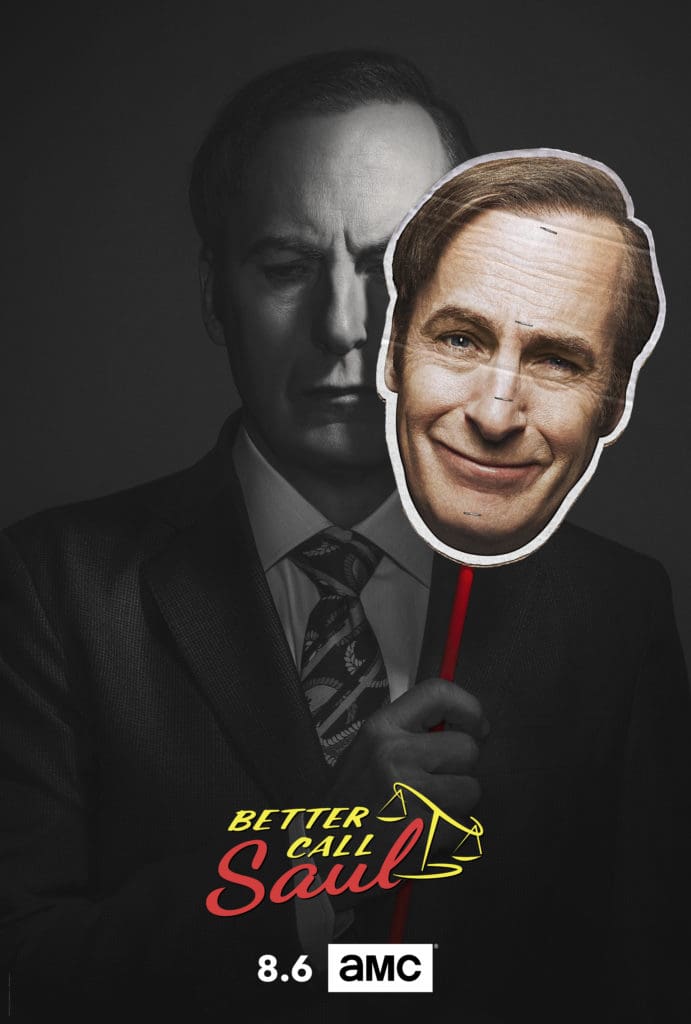
The cast and crew of AMC’s Better Call Saul gathered at San Diego Comic 2018 to address the Breaking Bad spin-off’s fourth season, the humor and harrow of the new season (and the whole series), and address some fan theories, and rumors that’ve popped up.
In this interview was Executive Producers and showrunners Vince Gilligan and Peter Gould, and series stars: Bob Odenkirk, Giancarlo Esposito, Rhea Seehorn, Patrick Fabian and Michael Mando.
At the end of Season Three we have the demise of Chuck (Michael McKean). It’s such an interesting and difficult relationship. Do you think Jimmy feels responsible for that, how do you think it’ll affect him?
Bob Odenkirk: I think he walked out of the room, and he kind of compartmentalized Chuck and wrote him out of his life the night before he died. So I think it’s natural for a person, if someone you know or are close to dies, to think “What was the last thing we talked about, what was the last thing I said or that he said to me?” In this case, Chuck said this really cold stuff and he really seemed to me that he wasn’t emotional or anything, he just seemed to be matter of fact about it.
So for me, Jimmy’s written Chuck out of his life, and he’s not going to let Chuck’s death weigh him down. These guys don’t agree, but we got through a whole goddamn season in that dichotomy and didn’t have a problem. I feel everything Jimmy does in Season Four fits with my philosophy of how he perceives Chuck and leaving Chuck behind him. Somehow it works as well for Peter, all that plot works just as well for him, and he feels like Chuck’s death is massive. Okay, you can disagree. Just like fans can disagree about what things mean, or whatever.
Do you miss Bryan Cranston?
Bob Odenkirk: I do miss Bryan Cranston. Bryan was the guy who really helped me into the tone of these shows. The first thing I did in Breaking Bad was the commercial for Saul that Jesse watches. It was very much like stuff I did in comedy my whole career [like] Mr. Show. It was kind of broad and fun and silly, and now I have a scene with Bryan Cranston. Bryan was amazing, and he was so heavy and serious and cold and dry and there was just a lot of, you know, texture and – so he really got me to focus. Working with people like Bryan – and Rhea [Seehorn], this marvelous person right here – working with people who are better than you really helps a lot.
Rhea Seehorn: That’s not true.
Do you think we’ll see Aaron Paul show up in the future?
Bob Odenkirk: I do. I’m speaking as a fan. [laughter]
Look, here’s what I know. I know that Hank Schrader knows something. Right? When they meet in the hallway, they give each other shit like they know each other. So Hank knows something. And I think, because of what Jesse says to Walt, “You don’t need a criminal lawyer, you need a criminal lawyer.” That line – obviously Jesse saw Saul’s commercial on TV; we saw that on Breaking Bad. I don’t think that’s enough [to cause] Jesse to recommend that they go to Saul. It’s just a commercial. I think he knew Saul and he knew Saul’s reputation. So I think those two characters, I think should be in future episodes.
Michael Mando: There’s more to that too. Max [Arciniega], who plays Krazy 8 — I don’t know if you guys remember all the way at the beginning of Breaking Bad — he had an incredible performance, with the whole bike lock and everything. So Jesse works for Max, and Max and Nacho are almost family, almost related. Nacho’s first mentioned in Breaking Bad by Bob’s character, so it’s clear that Nacho and Saul have done this thing in Breaking Bad, “It wasn’t me that sent you, it was Ignacio.”
So Saul and Nacho know each other for sure, and a hundred percent Nacho and Krazy 8 know each other very well through family. And Jesse Pinkman works for Krazy 8. And there’s actually maybe – I don’t know if this is true or not – but there could be a reference to Jesse Pinkman in Better Call Saul if you paid attention. I don’t know if it’s Jesse Pinkman, but Krazy 8 mentions a new dealer who is brand new to his squad who is sort of not really good at it.
[laughter]
Michael Mando: And people think that’s Jesse’s first sort of introduction. I don’t know if that’s true or not.
Bob Odenkirk: What a cool show I’m on.
Michael Mando: And there’s a guy that sells chicken.
[laughter]
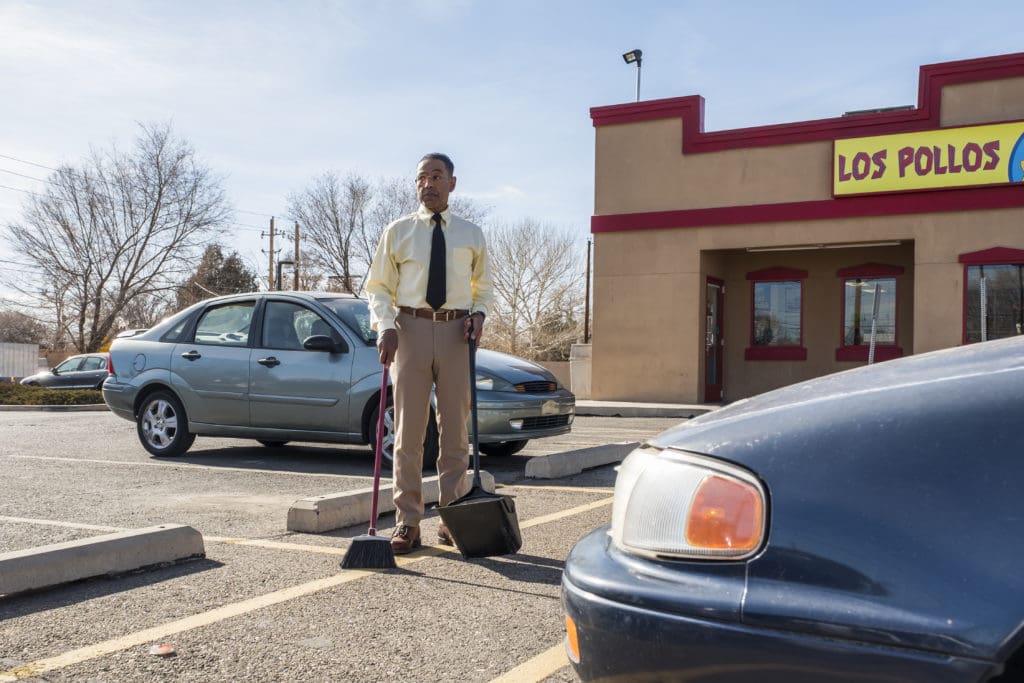
Will we see a relationship develop between Nacho and Gus this season?
Giancarlo Esposito: Certainly worlds will collide in Season Four. These two characters have different agendas that each of them have not known about of each other, the audience may see it coming but more than likely will not. But when those agendas are revealed, then obviously action has to be taken. It’s something I think will more than likely be inevitable, that I will neither confirm nor deny.
Michael Mando: Nacho’s storyline kind of breaks through and comes into focus this season. The arc of the character for me is very much a redemption story. It’s a story of a good son who has fallen from the good graces of his father and has to learn about self-sacrifice in order to redeem himself and hopefully save his father and himself. And what’s really interesting is that I find whenever we had scenes with Giancarlo Esposito, the first time I had a scene with Giancarlo Esposito, I was a huge fan of his and I remember being at the Los Pollos and looking into his eyes and the first thought that crossed my mind was “This guy’s got people in his basement.” [laughter]
And I don’t know where that came from, but it gave me chills. I really compare it to this situation, sort of man vs. corporate. I feel like Nacho’s got this romantic idea of being able to walk out of hell, and then he faces this corporation that is operating on a level almost with being mental, it’s pure mental genius.
Giancarlo Esposito: The other element of it that I believe could be expanded on here and explored as well, is the father relationship, the relationship between Nacho and his father, and the disappointment he has, his father has in him, and the relationship to Gus Fring who might be able to teach Nacho something he doesn’t know. He can be reined in, which is the big question, can Nacho be reined in to learn something new and become a different cog in the wheel for the cartel? I’m not sure that’s possible, because Nacho has such a very strong personality and has ideas of his own.
But it’s something that on this show is so very special because all the characters are so entwined with each other, one step removed, I can’t wait for the moment we really have more screen time with Jimmy. Jimmy is moving into a space that he becomes darker and darker, seamlessly performed by Bob, where you can still have this feeling that there’s the old Jimmy McGill there, but we’re seeing him – in all of his presence and all of his consciousness – move more towards Saul because he’s more comfortable there. So that puts him in direct conflict with Gus and eventually there’s going to be something happening there too, I would imagine.
In regards to the main two characters who were in both shows, Breaking Bad and Better Call Saul. When you now are doing time jumps, how do you sort the evolution of your character, and what you’re performing in that moment?
Bob Odenkirk: Well, that might be – for me it’s, Saul is a thinner character than Jimmy. He’s just a front. He’s not a whole person, really.
Michael Mando: You looked fatter in Breaking Bad though.
Bob Odenkirk: That’s because he had a bulletproof vest on.
[laughter]
Bob Odenkirk: Yeah, so… Boy. Spoilers, right? Because this season there’s some cool shit. I don’t want to be the one to say it.
[laughter]
Rhea Seehorn: It’s hard. It’s hard.
Bob Odenkirk: Anyway, the point is I did have to ask that question myself this season so maybe that tells you something. Who is Saul, how do I play him now that I’ve played Jimmy? He’s just, he’s not as dimensional as Jimmy, it’s kind of easy, relatively.
Giancarlo Esposito: For me, I always have to remind myself that this is Gus prior to Gus. My younger self would have a different way of exacting his mission, trying to figure out how to really have people understand you can run these better ideas that would expand the cartel. But also because we’re younger there’s more vulnerability and there are more mistakes that you make.
So in my mind it’s tracking – and look, Gus primarily is mysterious, the less you know about him the more you want to know and the more you want to see him. So with the work that I do, I try to do physically and facially and in my gut, is to make him seem a little less seasoned in certain areas, and maybe that is to make him a guy who’s not so in control as when you met him in Breaking Bad. So for me that’s always trying to keep that in the forefront of my brain that he’s still trying to figure that out as we go, so there’s some nuance to the performance that I bring this time around on Saul as opposed to what you saw on Breaking Bad.
Peter Gould: Can I just add, this season you get to see the wrath of Gus Fring, and it is terrifying to behold.
Michael Mando: Bob was talking some crap about you behind your back earlier.
Peter Gould: Just what I would expect.
Bob Odenkirk: I was talking about how you and I – I got a very good question, very perceptive – who asked me… Chuck’s death and how it affects Jimmy, and I talk about how I feel like there is some dichotomy that plays out perfectly fine this season in that I perceive Jimmy as having to kind of disown Chuck. Remember when they had that conversation happened the night before Chuck’s death, when Chuck says “You meant nothing to me and I never really thought of you” and then from that point on, Jimmy kind of compartmentalized Chuck and said “I’ll never let this guy ever affect me.” So when Chuck dies the next day it’s already – that’s where his head is at, in his compartmentalization. But it seems that – you talk about what you think.
Peter Gould: This is such an interesting topic.
Bob Odenkirk: It’s really about how people grieve, which is what we talked about, Rhea and I talk a lot about this, people grieve in very unique, idiosyncratic ways. And you can’t call one way right and one way wrong.
Peter Gould: I think that’s exactly right. The greatest moments for me on the show are when the characters surprise me – surprises the writer’s room, surprises on the set. And I’ll say that the way Jimmy greaves, his process, is some of the most surprising material we’ve ever worked on. It’s very complex, and I think the other thing that fascinates me about this season – I want to make sure it doesn’t sound too heavy – because there is a lot from Bob that makes me laugh.
It’s a very funny season, this is a very dramatic season, but this is also a season that has – at least as part of it – the effect that someone who is dead still goes on living and not in terms of being a literal ghost, but when you lose someone, physically, you haven’t lost them from your mind, you haven’t lost them from your heart. The effects of people who are gone – I take some of my own personal experience, my father died literally before I was born, and the impact of his life and his work on me is enormous. And I never met him. So this is one of the things we were all thinking about and talking about in the writer’s room about this event from Jimmy.
And I will say, Jimmy McGill, boy, he is a fun character, he is somebody with a zest for life. He is somebody who likes to move, he is somebody who has passion, but there is a lot more to him than meets the eye. And that’s one of the things – if we agreed on everything instantly, then we’d be doing something wrong.
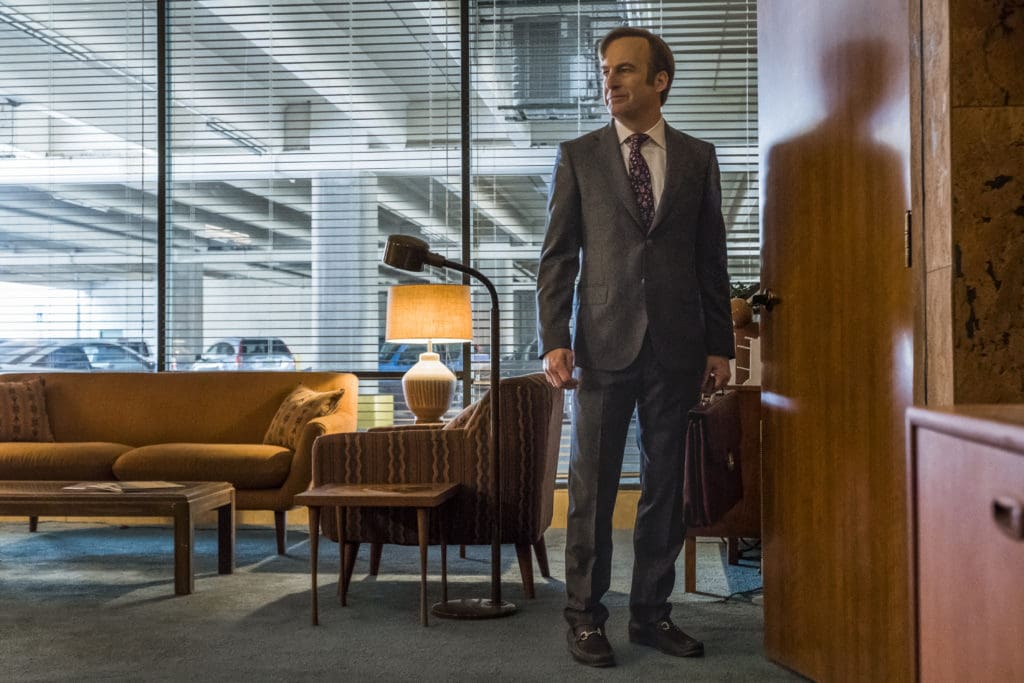
Bob Odenkirk: But we do agree on that Chuck’s life and death resonates through the rest of this character’s life. That is the kind of impact that he never really – it’s never gone from his universe, his interior universe. That we agreed completely on, it’s not like he can acclimate to that and it doesn’t ever affect him again. This is the rest of his life. This is one of the things, one of the few things in his life that will never not matter. And this season – because she hasn’t said much, I must tell you it’s a lot of Jimmy and Kim. Because the next person in his world that’s most important to him is Kim, and she also – Chuck was important to her, too. So she has to also deal with Chuck disappearing. In flames.
Rhea Seehorn: Yeah, which was – we have a lot of conversations about grieving and the process of grieving and if you’ve ever been a supporter of someone who is grieving or their support system, that constant question of when do you tell someone that their behavior needs to stop, or something, whatever their coping mechanisms are? We had a lot of very interesting conversations and I think it will be fun to see viewers and fans figure out what is accessible, what is strange, what is odd, and it’s all particular. It’s also individual to the characters and there’s things that Jimmy is doing that you normally might say “that’s unacceptable.”
But because somebody is grieving, and it starts to really open up your mind to how to be somebody’s support system through that and what exactly is the strange behavior while he’s also in this gradual devolution to becoming Saul, it was a very interesting jigsaw puzzle, for me, to figure out what is odd behavior and what is not odd behavior and then for Kim who is so, so much of a loner and going through the guilt that I think death can magnify also what seemed like maybe questionable, what you were responsible for is suddenly magnified and mythologized and she’s going through that while also being the supportive person of Jimmy, who lost Chuck. It was a lot. It was a lot. And then Hamlin has a very interesting, surprising reaction to it as well.
Patrick Fabian: One thing I have to say, I was just sitting here taking a scorecard, here we are sitting with these guys and girls up here on stage, and it seems to me without a doubt, Howard Hamlin now occupies the moral high ground in this show.
[laughter]
Michael Mando: I think my dad might.
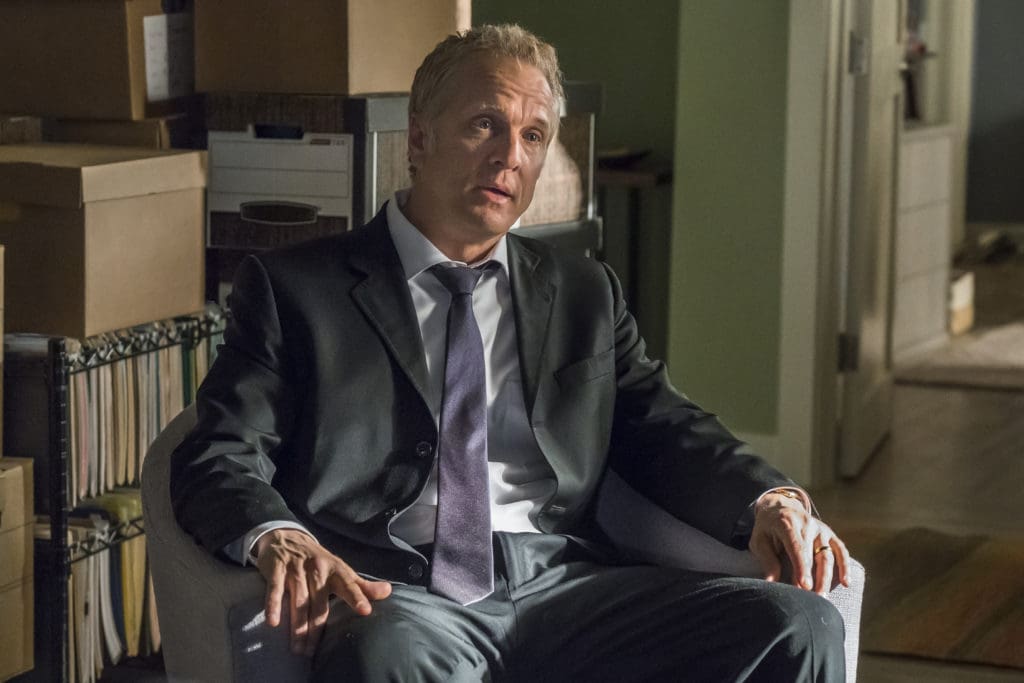
Patrick Fabian: Your dad, but he’s not here. Sitting here – he’s dirty, he’s dirty, she’s a cheat, she’s cheated with him, I’m like ok, Howard is the last man standing. But to Peter and Bob and Rhea’s point, the vacuum of Chuck, the vacuum that he leaves amongst us, and that was palpable – and a quirk, at the end of the season last year, my last day working with Michael, was indeed the final scene where I give him the check and kick him out the door, and it was shot in sequence, which is sort of a rarity in television. And so my last image of working with Michael McKean is applauding and then not looking at him as he gets shown the door. And that really didn’t dawn on me even after I saw it and I enjoyed, I loved working with him so much, a towering talent to work beside.
But the first day of work we came back to set, season four, you know, we are dealing with that aftermath. And the first time I’m on set, his absence is there and I felt it professionally and then also personally. Because I didn’t realize how much I relied on this mighty oak with me in a scene. I always had this secret thing in my mind where if I was in a scene with him, I always felt like, “Well no matter what this scene is always going to be good because Michael McKean is in it.”
[laughter]
Patrick Fabian: And I didn’t realize how much I thought that until the first time I was doing a scene this year and I realized, “oh he’s not coming back to save you, Patrick.”
[laughter]
Rhea Seehorn: But also additionally for me, one of the most interesting things, was the question of grieving someone, in character, that you don’t really like, you know what I mean? [laughs] Feeling sad about someone that was an ass. I found it very complex and interesting that it was – she used to, Kim and Jimmy – and Hamlin- had histories of putting this man on a pedestal in all sorts of ways and he fell off of them long before he died. And Kim has her own personal issues with everything else, but then the man committed suicide, so it was – I found it very interesting to figure out what we do with the memory of the dead and the legends we start telling ourselves.
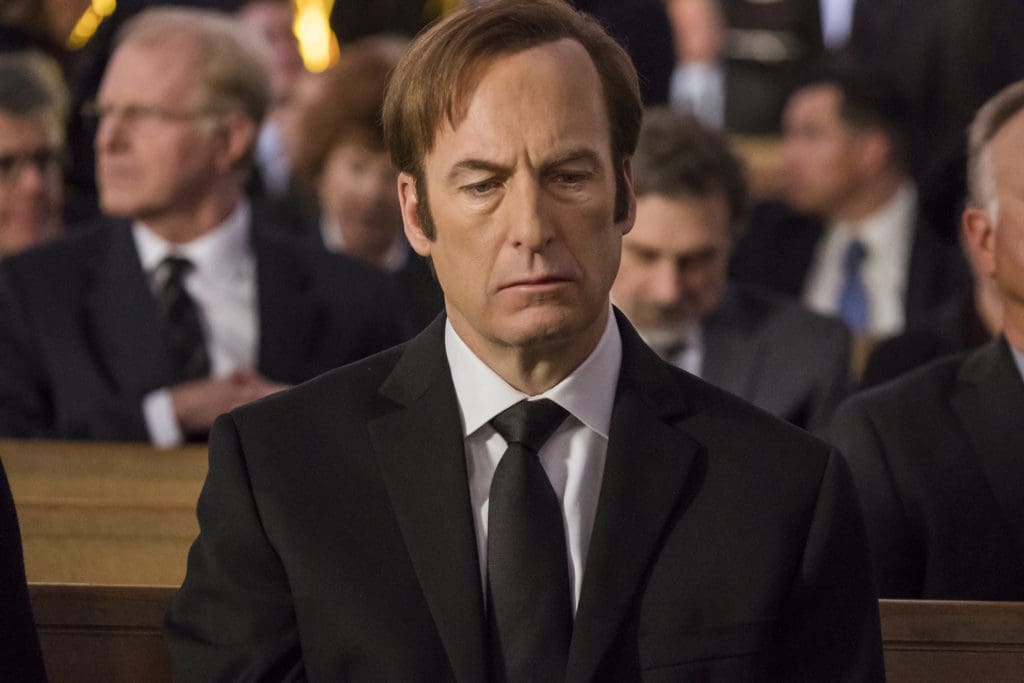
When working on the show, do you feel that essentially knowing the ending of Better Call Saul makes it easier or presents more challenges?
Vince Gilligan: I thought that this would be the easiest thing in the world, I thought this would be a cake walk. Because going back through the years, I thought, we don’t know where this thing is going. This was like exponentially harder, and because when you have to backfill into it, you have to get all the details right and on top of that it dawned on us that we really don’t know the end. We know at a certain point it becomes the Breaking Bad story, but what happens after that? The Saul Goodman/Jimmy McGill/Gene of Omaha a lot goes on, what of that – what the heck is that? We’re just going to end it?
Peter Gould: It’s like the world’s most complicated crossword puzzle mixed with trying to stay true to the characters. We started the show with 62 episodes of Breaking Bad history, and many, many episodes of Saul Goodman, who spoke a lot. And he told a lot of little anecdotes about his life, some of which we always thought would be fun if they were true, but Jesus, if we had known that every little thing that he said was going to come back to us – we’re still chewing on some of those, I’ll be honest with you. It was really tricky.
The thing I learned on Breaking Bad, the trick that often times people ask, “Don’t you need to plan everything in advance?” Yes and no. Because Vince taught me on Breaking Bad, when we worked on the show, we looked really carefully at what we’d already done. Whether it’s ahead of time or behind the time, and we asked ourselves a lot of questions. Why is this character doing this? Why are there two chickens in the Los Pollos Hermanos logo? Who is the other chicken brother?
[laughter]
Peter Gould: We asked ourselves a lot of questions. If his name is McGill, why did he change his name to Saul Goodman? Is that explanation that he gives Walter White, the whole story – why would anyone design an office like that? These aren’t all unanswerable questions, but I will say, this season, you learn more about the answer to some of these questions. Obviously the chicken brothers we know about, but you learn a lot – each season the characters start answering some of the questions we started with.
The biggest one, for me anyway, was always how does this guy that I’m starting to really like – Jimmy McGill – how does he become Saul Goodman, who I am fascinated by? What happened to him? I think the last season, of course, you saw what happened with Chuck. In this season you start to understand it all. And I’ll also say, Bob and Rhea created these two characters in this very adult, empathetic relationship. There’s this connection between Jimmy and Kim that I find just… Tremendous. Fascinating. And also very touching. And the idea that he’s going to become Saul Goodman after having this open-hearted relationship with a woman who is as wonderful as Kim Wexler, kind of breaks my heart.
Better Call Saul Season 4 is now airing Mondays on AMC.
Interview conducted by Al Mannarino and Ryan DeMarco. Transcription by Melissa Jouben.

